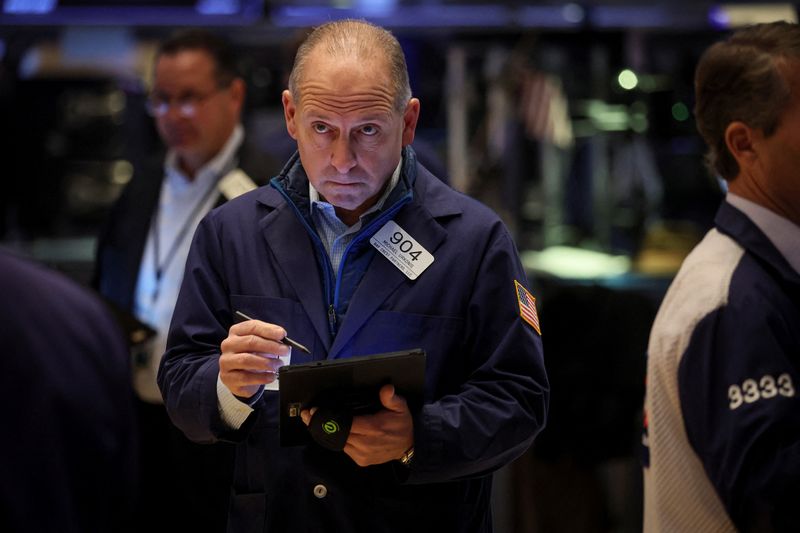By Geoffrey Smith
Investing.com -- Stocks start 2023 on a positive note, but the dollar is also bid higher from oversold levels. Tesla delivers fewer cars than expected in December. China's COVID death toll continues to rise but there are tentative signs of improvement. German headline inflation looks set for a big drop in December, and natural gas futures hit their lowest in 10 months as warm weather cuts European demand. Crypto's 2022 winter shows no sign of ending though. Here's what you need to know in financial markets on Tuesday, 3rd January.
1. Dollar surges but risk appetite seems intact; German inflation falls
Global markets had a fairly confused overnight session, as the dollar rose along with both bonds and equities, in contrast to normal trading patterns.
European and Asian stocks were broadly higher on hopes that the COVID-19 wave in China may soon peak and allow a recovery in Chinese economic activity to be priced in. The Hang Seng index in China finished at a four-month high, while European stock indices gained by between 1% and 2%. Europe was supported by another big drop in headline inflation in Germany, thanks to government measures capping household energy prices.
Despite the strong performance of risk assets, the dollar index – which tracks the greenback against a basket of advanced economy currencies – rose by over 1.2%, bouncing from levels that many had seen as oversold (at least on a short-term basis) toward the end of last year. That was due not least to gains against the euro after the German inflation numbers.
2. China's COVID struggle near turning point?
China’s economic performance stayed in the spotlight as various reports suggested ongoing high levels of deaths from COVID-19 but, at the same time, tentative signs that the wave may be peaking.
Officials in the city of Beijing said casualty numbers had fallen on Monday, while a revival in mobility data suggested that life was starting to return to normal in some other cities. Local media reported that Apple (NASDAQ:AAPL) supplier Foxconn (TW:2354) is now back operating its massive factory in Zhengzhou – the scene of some of the worst COVID-related disruptions - at 90% of capacity.
That couldn’t stop December’s data from being bad, however. The Caixin manufacturing index stayed below the key 50 level for a fifth straight month in December.
3. Stocks set to open 2023 higher despite Tesla disappointment
U.S. stock markets are set to open the year higher after a muted end to 2022, with all three indices set to recoup their December 31st losses and then some.
By 06:25 ET (11:25 GMT), Dow Jones futures were up 240 points, or 0.7%, while S&P 500 futures were up 0.8% and Nasdaq 100 futures were up 0.9%.
Stocks likely to be in focus later include Tesla (NASDAQ:TSLA), which opened lower in premarket after it announced lower-than-expected delivery numbers for December (albeit that still capped a record year for output by the EV maker). Also in focus may be Univar (NYSE:UNVR), after German rival Brenntag (ETR:BNRGn) said it had ended talks about a possible merger, and General Electric (NYSE:GE), whose healthcare unit is set for its market debut this week.
4. Silbert-Winklevoss row turns ugly
The nightmare of 2022 continues for crypto. Two of the biggest whales left in the space clashed publicly on Monday over the paralysis at Digital Currency Group’s Genesis, which suspended client withdrawals from its Earn program in November.
Cameron Winklevoss, co-founder of the Gemini investment platform which has substantial amounts of money at risk in Genesis Earn, accused crypto tycoon Barry Silbert of using Genesis funds to shore up his affiliated businesses, notably the Grayscale Bitcoin Trust ETF. Winklevoss called on Silbert to resolve the issue by January 8th. He didn’t say what he would do if Silbert missed that deadline.
Silbert rejected Winklevoss’s accusations, saying his Digital Currencies Group is current on all its loans and doesn’t have to pay Genesis any interest until May.
GBTF is set to open close to a two-year low, while Bitcoin remains stuck below $17,000 on sharply reduced trading levels.
5. Oil falls on recession warning, natgas swoons as Europe supply fears ease
Crude oil prices fell amid concerns for the global demand outlook, with a recession warning from International Monetary Fund managing director Kristalina Georgieva capturing the tone.
"We expect one third of the world economy to be in recession" this year, Georgieva told the CBS news program Face the Nation. U.S. crude futures fell 1.4% to $79.13 a barrel, while Brent fell 1.4% to $84.69 a barrel.
However, the bigger action was in natural gas, where a new set of weather forecasts predicted that Europe would continue to enjoy unseasonably warm temperatures, further easing concerns about a supply crisis – at least until next winter. Natural gas futures are now below their pre-Ukraine invasion levels in both the U.S. and Europe.
